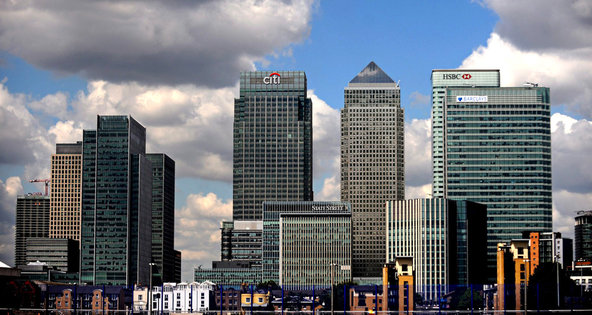 Andy Rain, via European Pressphoto AgencyBanks at Canary Wharf in London.
Andy Rain, via European Pressphoto AgencyBanks at Canary Wharf in London.
LONDON – The British Bankers’ Association is expected to lose control over the interest rate at the center of a recent manipulation scandal, according to a person with direct knowledge of the matter.
The move is likely to be announced on Friday, when Martin Wheatley, managing director of the Financial Services Authority, the British regulator, outlines the findings of a review of the London interbank offered rate, or Libor, added the person, who spoke on the condition of anonymity because he was not authorized to speak publicly.
The British government called for changes to the benchmark interest rate, which underpins more than $360 trillion of financial instruments worldwide, after Barclays agreed to pay $450 million in June to settle charges that some of its traders manipulated the rate for financial gain.
In the wake of the scandal, Barclays’ chief executive, Robert Diamond Jr., and its chairman, Marcus Agius, resigned. Some of the bank’s traders may still face criminal prosecution over their role in the manipulation of Libor. And other banks, including UBS and Citigroup, are currently under investigation in a number of jurisdictions about the potential manipulation of the rate.
The move to remove the British Bankers’ Association from its role of setting Libor would be a blow to the organization, which established the rate in 1986.
Libor Explained
Regulators have continually questioned the trade body’s role in the recent scandal.
In documents released by the Bank of England in July, authorities called on the group to change the Libor rate-setting process, which includes a daily poll of a number of banks about what interest rate they would pay if they had to borrow money from the capital markets.
Despite calls from the British Bankers’ Association’s chief executive at the time, Angela Knight, for regulators to take a greater role in the rate-setting process, authorities balked at taking a more hands-on approach, according to the central bank documents.
By taking the Libor-setting process away from the bankers group, it is likely that authorities will now become more directly involved.
A spokesman for the Financial Services Authority of Britain declined to comment.
In a statement, the British Bankers’ Association said that it would work with British authorities about potential changes to the rate.
“If Mr Wheatley’s recommendations include a change of responsibility for Libor, the B.B.A. will support that,” the organization said in a statement.
A spokesman for the British Bankers’ Association declined to comment on whether the organization would lose control of setting Libor.
The expected overhaul of Libor comes a day after Gary Gensler, chairman of the Commodity Futures Trading Commission in the United States, suggested authorities should rework or replace the interest rate.
“It is time for a new or revised benchmark – a healthy benchmark anchored in actual, observable market transactions – to restore the confidence of people around the globe that the rates at which they borrow and lend money and hedge interest rates are set honestly and transparently,” Mr. Gensler told the European Parliament on Monday in remarks delivered via video from Washington.
Article source: http://dealbook.nytimes.com/2012/09/25/british-bankers-group-seen-losing-control-over-libor/?partner=rss&emc=rss